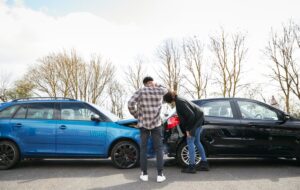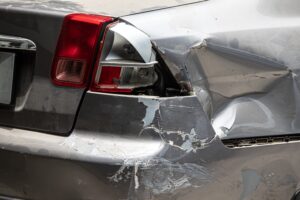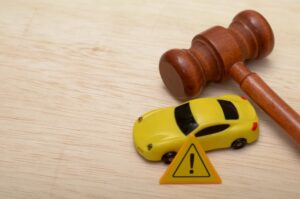Rear-end collisions happen every day on West Virginia roads, often leaving drivers and passengers with painful injuries and unexpected expenses. When another driver hits you from behind, questions about who’s responsible for those losses quickly follow: Who pays for rear-end collisions?
In most cases, the driver who struck the vehicle in front bears the blame, but determining responsibility isn’t always straightforward. Proving fault, dealing with insurers, and recovering payment for medical care, lost income, and property damage often require professional legal support.
For people hurt in these accidents, holding negligent drivers accountable provides a path toward financial stability and peace of mind. Skilled representation helps protect your rights and builds a strong claim against those responsible.
If a rear-end collision in West Virginia injured you or someone you love, a car accident lawyer can review your case and explain your legal options during a free consultation.
Schedule a free case evaluation
Key Takeaways: Who Pays for Rear End Collisions in WV
- Rear-end collisions in West Virginia typically place fault on the driver who struck the vehicle ahead.
- The front driver may share some liability if they made unsafe maneuvers or stopped abruptly without cause.
- West Virginia follows comparative negligence, which means each party’s share of fault affects their recovery.
- Evidence such as police reports, traffic camera footage, and witness statements plays a major role in proving liability.
- Legal guidance helps you pursue compensation for medical costs, lost income, and other damages related to the crash.
Who Is at Fault in a Rear-End Collision?
 Determining who caused a rear-end accident is a central part of every claim. While it often seems obvious that the rear driver bears responsibility, certain circumstances can shift or share liability.
Determining who caused a rear-end accident is a central part of every claim. While it often seems obvious that the rear driver bears responsibility, certain circumstances can shift or share liability.
The Presumption of Fault in West Virginia
In most cases, the driver who strikes another vehicle from behind is presumed to be at fault. West Virginia law requires motorists to maintain a safe following distance. When a rear driver hits the car ahead, it typically suggests they were either distracted, speeding, or too close to react in time.
However, this presumption isn’t absolute. The rear driver can attempt to show that other factors caused the crash, such as a sudden hazard or mechanical failure. To overcome the presumption, they must provide convincing evidence that their conduct wasn’t negligent.
When the Front Driver May Share Liability
Sometimes, the front driver also plays a role in causing a rear-end collision. Liability may be shared if they:
- Suddenly reversed: Backing into another vehicle without warning may make the front driver partially liable.
- Stopped abruptly: A driver who slams the brakes without reason, especially in heavy traffic, could share responsibility.
- Had non-functioning brake lights: Failing to maintain safe and visible lighting may contribute to an accident.
Shared liability doesn’t excuse the rear driver from blame, but it can reduce the front driver’s compensation under comparative negligence rules.
Comparative Negligence Rules in West Virginia
West Virginia follows a modified comparative negligence rule. This means each party’s degree of fault determines how much compensation they can recover. For example, if you’re found 20 percent responsible, your recovery may be reduced by that percentage.
However, if you’re more than 50 percent at fault, you can’t recover damages. This rule encourages fair accountability while recognizing that accidents often have multiple contributing factors.
What Does West Virginia Law Say About Rear-End Accidents?
West Virginia traffic laws set clear expectations for safe driving behavior. These rules help courts and insurers decide who should pay after a rear-end collision.
Following Too Closely Under West Virginia Code
West Virginia Code §17C-7-10 states that drivers must not follow another vehicle more closely than is reasonable and prudent. The safe distance depends on traffic conditions, speed, and road type. When a driver violates this rule and causes a crash, it’s strong evidence of negligence.
Duty of Care for Drivers
Every driver in West Virginia owes a duty of care to others on the road. This means they must operate their vehicle responsibly to avoid harming others. Examples include obeying speed limits, staying alert, and avoiding distractions like texting. When someone breaches this duty, they may be held legally responsible for any resulting injuries or property damage.
Insurance Requirements in West Virginia
State law requires all drivers to carry minimum liability insurance coverage:
- $25,000 for bodily injury per person
- $50,000 for bodily injury per accident
- $25,000 for property damage
These policies help ensure that injured drivers can recover compensation from the at-fault driver’s insurer. However, when damages exceed these limits or the at-fault driver is uninsured, victims may need to turn to their own uninsured or underinsured motorist coverage.
How Is Liability Determined After a Rear-End Crash?
Determining liability after a rear-end collision involves examining the facts, evidence, and behavior of each driver before, during, and after the crash. Even though most rear-end collisions are caused by the driver in the back, investigators and insurance adjusters still need to confirm exactly what happened. Establishing fault ensures that the right party takes financial responsibility for injuries, property damage, and other losses.
Evidence Used to Prove Fault
Strong evidence helps demonstrate how the crash occurred and who was responsible. Common examples include:
- Photos and videos: Pictures of vehicle damage, skid marks, and debris help show the force and direction of impact.
- Traffic camera or dashcam footage: These recordings can confirm whether a driver followed too closely or failed to brake.
- Vehicle inspection reports: Mechanical evaluations may show whether brake failure or other defects contributed to the crash.
Police Reports and Their Role
When officers respond to a crash, they create a report detailing their observations. This document may include statements from drivers and witnesses, diagrams of the scene, and citations issued for traffic violations. Insurance companies often use these reports to guide their liability decisions.
Witness Statements and Documentation
Eyewitness accounts can provide valuable insight into what happened moments before the collision. Statements from passengers, pedestrians, or nearby drivers help confirm speed, following distance, and reaction times. Keeping all records organized, including medical bills and repair estimates, supports your claim for financial recovery.
What Damages Can You Recover in a West Virginia Rear-End Collision?
The losses from a rear-end accident extend beyond vehicle repairs. Victims often face medical treatment, missed work, and lasting pain. West Virginia law allows injured parties to pursue compensation for both financial and personal harm.
Economic Damages Available
Economic damages cover measurable financial losses such as:
- Medical expenses: Hospital stays, physical therapy, medications, and follow-up care.
- Lost income: Wages missed while recovering or attending medical appointments.
- Property damage: Costs to repair or replace your vehicle and personal belongings damaged in the crash.
Non-Economic Damages You May Claim
Non-economic damages refer to the human impact of an accident. These may include:
- Pain and suffering: The physical discomfort and emotional strain following an injury.
- Loss of enjoyment of life: When injuries prevent you from participating in hobbies or daily activities.
- Emotional distress: Anxiety, depression, or trauma resulting from the crash experience.
How Comparative Fault Affects Your Recovery
Under comparative fault, your compensation is reduced by your percentage of responsibility. If your share of fault is 25 percent and your total damages equal $40,000, your recovery would be $30,000. This system balances fairness and accountability in determining payouts.
Do You Need a Lawyer for a Rear-End Collision Claim?
 Due to the legal complexities and other challenges in obtaining compensation, an attorney often improves outcomes. Rear-end accident cases sometimes involve disputes over liability, insurance coverage, or the value of damages. A lawyer can address all of that and fight to help you recover the maximum compensation available.
Due to the legal complexities and other challenges in obtaining compensation, an attorney often improves outcomes. Rear-end accident cases sometimes involve disputes over liability, insurance coverage, or the value of damages. A lawyer can address all of that and fight to help you recover the maximum compensation available.
When to Hire an Attorney
Consider speaking with an attorney if:
- The insurance company denies or undervalues your claim.
- You sustained serious injuries requiring extended medical care.
- The other driver disputes fault or blames you for the crash.
Legal support can relieve stress by managing communication with insurers and gathering the evidence needed to support your case.
Common Insurance Company Tactics
Insurers sometimes attempt to reduce payouts by claiming your injuries existed before the accident or by offering low settlement amounts quickly after the crash. They may also question medical treatments or delay responses to pressure claimants into accepting less.
A lawyer familiar with these tactics can step in to hold insurers accountable and demand fair treatment.
Benefits of Legal Representation
Having an attorney helps level the playing field. Your lawyer can:
- Handle negotiations: Communicate directly with insurance adjusters to prevent unfair offers.
- Calculate damages: Include all short-term and long-term costs related to the injury.
- Prepare for litigation: Present evidence effectively if your case goes to court.
How Our Attorneys Can Help
At Robinette Legal Group, PLLC, we guide clients through every stage of the claims process with care and precision. Our team understands how rear-end collisions affect families and the financial strain that follows. We take the time to investigate thoroughly, gather evidence, and communicate with insurers on your behalf.
We use our knowledge of West Virginia law to identify liable parties and strengthen your claim. Whether through negotiation or in court, we work to secure fair compensation for your medical costs, lost income, and other related damages. Our firm has helped many accident victims recover payment that supports their healing and future stability.
Our approach centers on compassion and accountability. We stay accessible throughout your case, keeping you informed about progress and next steps. You don’t have to manage legal deadlines, paperwork, or insurer tactics alone. Our goal is to provide clear guidance and steady support as you move forward after a rear-end collision.
Frequently Asked Questions About Rear-End Accident Claims
What if the other driver claims I brake-checked them?
If another driver accuses you of brake-checking, their insurer may try to shift fault. Evidence such as dashcam footage, witness statements, and vehicle data can clarify what happened. Your attorney can help collect and present this evidence to counter false claims.
How long do I have to file a claim in West Virginia?
West Virginia law generally gives injured people two years from the accident date to file a personal injury lawsuit. Missing this deadline may bar recovery, so starting your claim early helps preserve your rights and access to evidence.
Will my insurance rates go up if I wasn’t at fault?
If another driver caused the accident, your rates usually shouldn’t increase. However, your insurer may still review your record when renewing your policy. Keeping documentation that proves you weren’t responsible helps prevent unwarranted rate changes.
Can I still recover damages if I was partially at fault?
Yes, as long as you’re not more than 50 percent responsible. West Virginia’s comparative negligence rule allows you to recover a portion of your damages based on your share of fault. For example, being 20 percent at fault means you can recover 80 percent of your total damages.
What if the at-fault driver has no insurance?
If the driver who hit you lacks insurance, you can file a claim under your uninsured motorist coverage. This part of your policy provides protection when an at-fault driver doesn’t have the required liability insurance. Your attorney can help file and support this type of claim to ensure your losses are addressed.
Contact Our Car Accident Attorneys in WV Now
 Rear-end collisions leave many West Virginians with injuries, vehicle damage, and unpaid bills. Taking quick action protects your right to financial recovery and ensures that evidence stays intact. The sooner you begin your claim, the stronger your case may be.
Rear-end collisions leave many West Virginians with injuries, vehicle damage, and unpaid bills. Taking quick action protects your right to financial recovery and ensures that evidence stays intact. The sooner you begin your claim, the stronger your case may be.
At Robinette Legal Group, PLLC, we represent people injured in rear-end crashes across West Virginia. We understand how insurance companies operate and know how to challenge their efforts to minimize payments. Our attorneys investigate thoroughly, build strong claims, and handle every detail of the legal process.
Reach out for a free, no-obligation case evaluation to learn more about your legal options. We’ll review your situation, explain how state law applies to your case, and outline your next steps. Let our team guide you toward a fair outcome after your rear-end collision.
Schedule a free case evaluation
Jeffery Robinette was admitted to practice law in 1991 and is licensed in all levels of state and federal trial courts in West Virginia. Mr. Robinette is also licensed in all state and federal appeals courts in West Virginia and the United States Supreme Court. As a National Board Certified Trial Attorney who has handled hundreds of motor vehicle, injury, and construction defect claims and a leading author on insurance claims settlement issues and difficulties in West Virginia, Jeff Robinette is uniquely qualified to represent your best interest.





